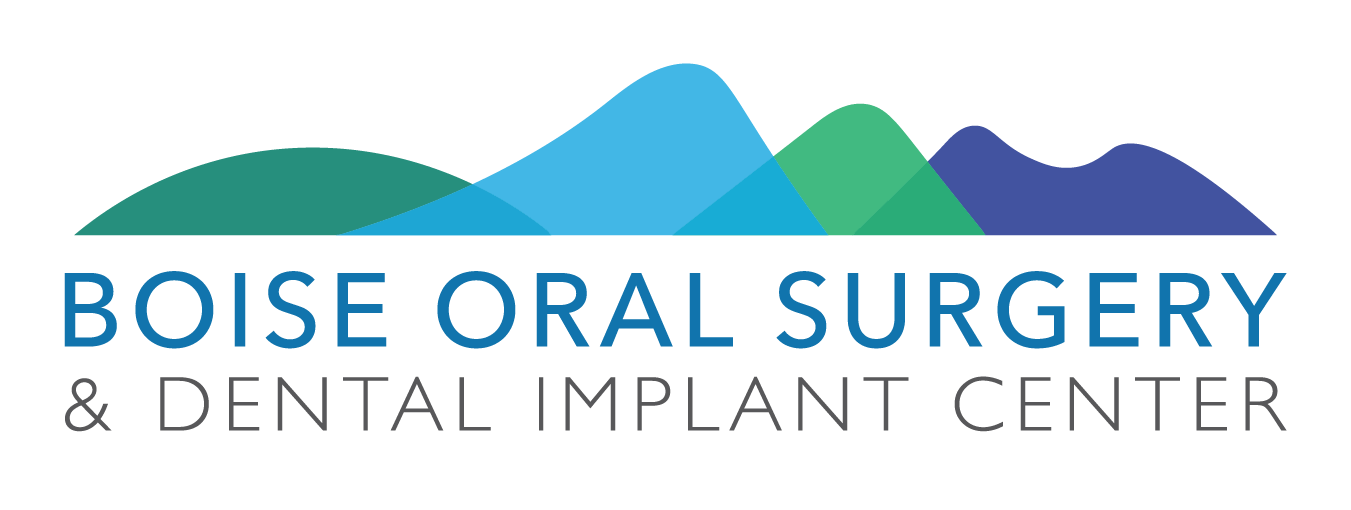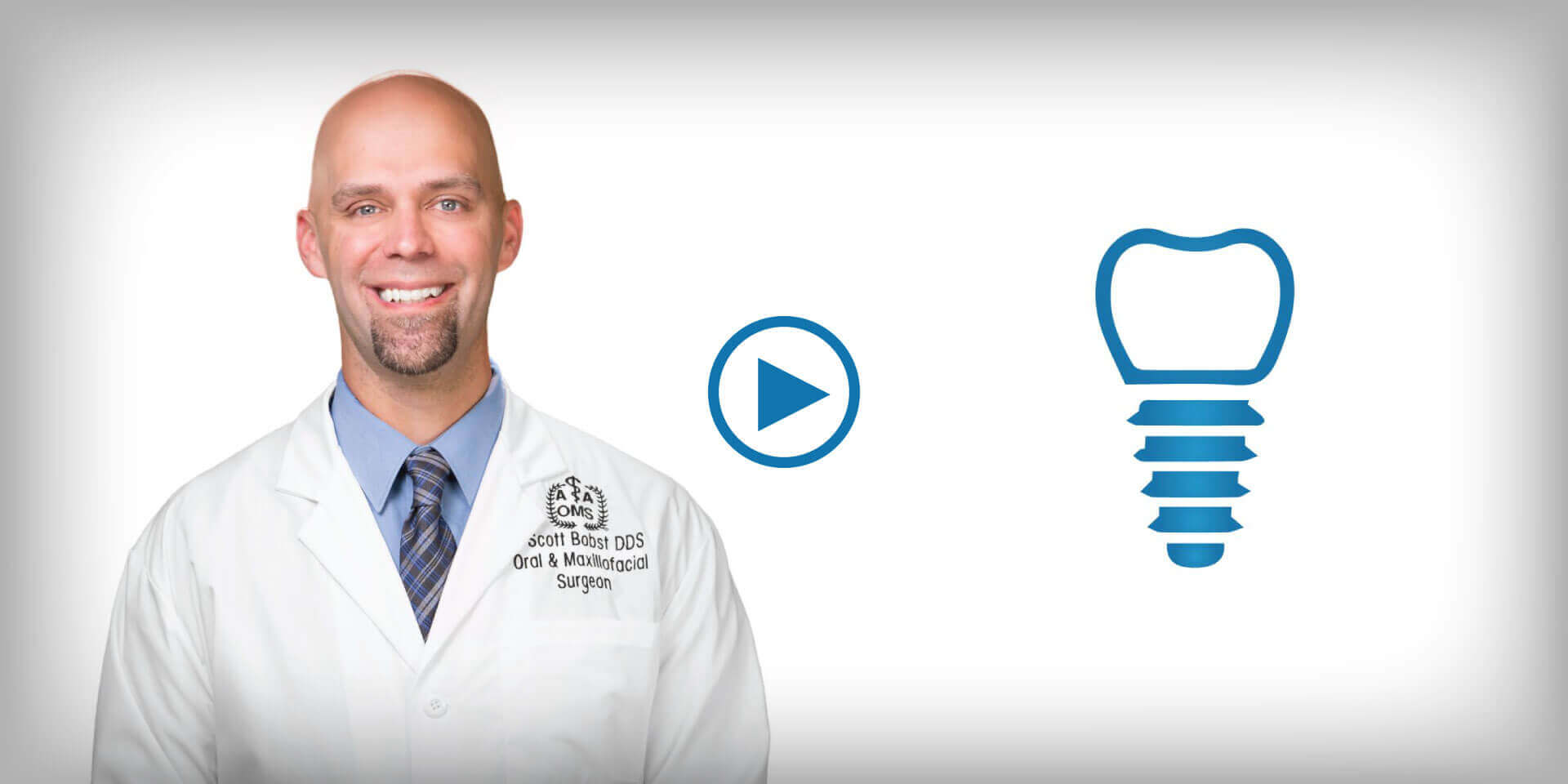Dental Implants Boise, ID
Boise Oral Surgery & Dental Implant Center
Home / Oral Surgery Procedures / Dental Implants in Boise
Dental Implant Testimonial
Watch The Story
Dental Implant Testimonial
Watch The Story
Dental Implant Testimonial
Watch The Story
Dental Implant Testimonial
Watch The Story
Why Should I Get Dental Implants?
Many patients in our Boise, ID, practice are looking for a long-term, healthy, and cost-effective solution for replacing missing or failing teeth. Dental implants are the preferred option because they are comfortable and reliable, and they prevent the destructive bone atrophy that can occur when there is no longer a tooth root secured within the jaw bone. If you are looking for a solution to restore your oral health and smile, we offer the full scope of dental implant procedures at Boise Oral Surgery & Dental Implant Center. Our oral surgeon, Dr. Bobst, specializes in full-mouth reconstruction utilizing dental implants and has placed thousands of dental implants for his patients from all over Boise, ID, and the surrounding communities.
Bone graft material can be acquired from a variety of sources. If it’s possible to use your own bone, it will likely be taken from another area inside the mouth around the third molar in the upper or lower jaw. In some cases, it may be necessary to take bone from the chin, hip or tibia. If you are not a candidate to use your own bone for a bone graft, the material can be obtained from a tissue bank, or a mineral bone substitute can be used.
There are many different bone grafting procedures that can be performed and the treatment that you receive will depend on your individual case and oral needs. Socket grafting is a common bone grafting procedure used to aid bone regeneration when a tooth is lost or extracted. During this procedure, the empty socket is filled with the bone grafting material immediately following tooth removal or loss and allowed to heal over a short period of time. This provides Dr. Bobst with a solid foundation for the future placement of dental implants.
When a larger area of bone is affected, an onlay or block graft can be used to restore the jaw. This is commonly used when patients are involved in accidents or trauma situations and multiple teeth are lost or when patients have used a removable denture for an extended period. Onlay grafts ensure that jaw bone deterioration does not change the appearance of the facial structure and prepare the mouth for the placement of a secure prosthetic tooth replacement.
How do Dental Implants Work?
Dental implants are a revolutionary three-part tooth restoration option designed to replace one tooth, several teeth, or an entire arch of teeth. The three parts of a dental implant are:
- The post (or screw), which replaces your natural tooth’s root. It is made of medical-grade titanium, which is an entirely biocompatible material that fuses with your jaw bone during healing.
- The abutment, which connects the post to your new replacement tooth (or teeth).
- The crown, which is custom-designed by your restorative dentist to match your natural teeth.
The fusion of the implant post with the surrounding bone in the jaw (a process called osseointegration) creates a healthy and secure foundation for a single tooth crown, a multi-tooth bridge, or in some cases, even a full fixed denture. Get ready to smile confidently again!
What are the Benefits of Dental Implants?
Dental implants have been a proven and preferred choice for over 30 years and provide our patients with an all-around superior solution for restoring your smile after tooth loss. Dental implants are fully functional, just like your natural teeth, and are also so natural looking that our patients often forget they have had a restoration. Implants are designed to work just like your natural teeth, and with proper care, they can last a lifetime. No other tooth-replacement option has such a high long-term success rate.
We find that most of our Boise Oral Surgery & Dental Implant Center patients who request implants are candidates for the procedure — in general, if patients are healthy enough to undergo a minor dental procedure, such as tooth extraction, they will be able to receive dental implants. Below are a few of the many benefits you can expect with dental implants:
- A permanent tooth loss solution, unlike bridges and dentures, which must be replaced after several years of wear
- The strength and stability to confidently eat and drink as you please without discomfort or embarrassment
- A beautiful, natural-looking new smile and the boosted self-confidence to go along with it
- Prevention of the destructive bone atrophy that can occur over time with missing teeth
- No inconvenient and unsightly removable parts
Dr. Bobst is an experienced oral and maxillofacial surgeon and an expert at dental implant placement. If you are interested in learning more about dental implants and want to discover if you are a candidate for this restorative procedure, please give the welcoming staff at Boise Oral Surgery & Dental Implant Center a call to set up an appointment for a consultation with the doctor.
Cost and Value of Dental Implants in Boise, Idaho
Simply put, dental implants add enormous benefit and value to the everyday lives of our patients. With proper care, dental implants can last a lifetime, and they help preserve oral health and prevent issues that might require costly and uncomfortable dental treatments in the future. Below are just a few of the reasons why dental implants are a valuable investment:
- Dental implants are permanently fused with your jaw bone, eliminating the need for costly future orthodontic or other treatments to treat dental shifting, bone loss, and other dental problems that can occur from tooth loss.
- Unlike dentures and fixed bridges which often require replacement after a few years of use, if properly cared for through regular dental visits and excellent oral hygiene habits, your implants can last a lifetime.
- Dental implants allow you to eat, speak, and smile confidently, improving your quality of life, which improves your overall health!
The best way to find out what your dental implant procedure will cost is to have a consultation with Dr. Bobst. The friendly staff at our practice will be happy to give you an estimate of your costs after Dr. Bobst has met with you to develop your treatment plan. Boise Oral Surgery & Dental Implant Center provides the finest care at the most reasonable cost to our patients. For your convenience, we accept several payment methods, and we offer financing options through CareCredit® as well. We are also contracted with several insurance providers.
For a detailed explanation of payment options, including information about CareCredit, click here.
For information about insurance coverage, click here.
Dental Implant Procedure Process
Your oral surgeon and your dentist will work as a team to place your dental implants and complete the final restoration. The precise plan and length of treatment will depend on the number of implants being placed, the condition of your jaw bone, and if you will require additional procedures such as tooth extractions. Even though each of our patients is unique, the general process of receiving dental implants is well-established and predictable. Throughout treatment, you will visit Boise Oral Surgery & Dental Implant Center two or three times over a period of a few weeks to a few months. Most of the time, the entire process goes as follows:
- Consultation. The dental implant procedure begins with a consultation with Dr. Bobst to determine your personalized treatment plan. During your consultation appointment, your condition will be reviewed, a personalized treatment plan will be formed including your choice for anesthesia, and imaging such as 3D scans will be taken to create accurate surgical guides for your procedure.
- Surgery. Once your chosen anesthesia has taken effect, the doctor will place the dental implant post in the bone beneath your gums. If you chose IV sedation, you will be asleep during the procedure and will not be aware of the surgery. After the surgery, the surgical site where your implant was placed will be sutured (stitched), and then you will have some time to rest and recover while your anesthesia wears off. Your responsible driver will then take you home.
- Recovery. After your dental implant is placed, there will be a three- to four-month healing period while the implant post fuses with the surrounding bone in the jaw (osseointegration). Once this process is complete, your implant will be strong enough to endure the pressure of chewing hard foods. Most patients are back to their regular routines after a couple of weeks. It’s possible that your dentist may make a temporary crown for you to wear during the healing period.
- Abutment and Crown Placement. Once your implant sites have healed sufficiently and the implant posts are securely fused with the bone in your jaw, Dr. Bobst will place the abutments. The abutments are the pieces that connect your new custom-made crowns to your implants. It’s time to show off your new beautiful smile!
Dental Implants Specific to Patient Need
At Boise Oral Surgery & Dental Implant Center, we also offer zygoma implants, which are recommended for our patients that do not have the facial/jaw bone density to withstand a dental implant. To perform a zygoma implant, Dr. Bobst will attach the dental implant post to a portion of the zygomatic bone, more commonly known as the cheekbone. The attachment to the cheekbone will support the implant and allow for a stable result. The procedure is otherwise identical to that of traditional dental implants.
Our expert oral surgeon, Dr. Bobst, has years of experience treating all kinds of oral and facial conditions, and he will gladly review your treatment options with you during an initial consultation appointment. If you would like more information, or if you have any questions about the services we offer, please feel free to contact our Boise, ID office. One of our staff members will be happy to assist you.
Bone Grafting for Dental Implants
During your consultation, your oral surgeon may determine that you require a bone augmentation procedure to prepare your jaw for dental implants. It is common for patients who have been missing a tooth or several teeth for an extended length of time to require a bone grafting procedure. The exact type of bone graft you receive depends on your condition and the location of the bone loss. Sometimes a sinus lift is required — this type of bone grafting surgery restores lost bone to a patient’s upper jaw (maxilla) when it is found to be too thin for the placement of dental implants. The sinuses are located above your top molars and encompass the roots of your upper teeth. Other types of bone grafting surgery include socket grafting and onlay grafts (or block grafts). All of these bone grafting procedures provide a solid foundation for your dental implants.
When you receive a bone graft, bone graft material is taken either from the bone in your body or a tissue bank. Your oral surgeon will place the material in areas that are lacking in bone density, along with a special gel that is rich in natural growth factors — these growth factors promote healing and allow your body to restore the lost bone. Some of the most common bone grafting procedures we offer at Boise Oral Surgery & Dental Implant Center include the following:
- Socket preservation prevents the rapid bone loss that can occur around an empty tooth socket. After tooth extraction, bone graft material is placed into the empty socket to prepare the patient for a dental implant procedure.
- Sinus lifts provide a solid foundation for dental implants that are replacing your upper back teeth. The wall that separates the sinuses from the upper teeth can sometimes be too thin to support an implant. In this case, Dr. Bobst will enter the sinus cavity and graft bone to elevate the sinus membrane. After appropriate healing of the graft, dental implants can be placed.
- Ridge expansion. When tooth loss occurs, the bony ridge that holds your teeth in place (the alveolar ridge) can become too narrow to support a dental implant securely. Ridge expansions increase the amount of bone around the alveolar ridge to make a strong foundation for your dental implants.
- Onlay grafts. This type of graft is often used when patients are involved in an accident or trauma in which multiple teeth are lost, or when patients have used a removable denture for an extended length of time. Onlay grafts prevent bone deterioration from changing the appearance of the facial structure and prepare the mouth for the placement of a secure prosthetic tooth replacement such as a dental implant.
- Nerve repositioning is a less common procedure that is sometimes used to prevent nerve damage. The inferior alveolar nerve, which gives sensation to the chin and lower jaw, lies beneath your lower molars. If the bone above the nerve is too sparse to place an implant without damaging this nerve, your oral surgeon may be able to move this nerve aside using a unique bone graft procedure.
A wonderful thing about dental implants is that they stimulate the bone beneath your gums just like the roots of your natural teeth. This will prevent further bone loss from occurring! Please give our practice a call to schedule a consultation with Dr. Bobst to develop a personalized treatment plan for your tooth restoration.
Dental Implant FAQ
Am I able to get dental implants?
If you are healthy enough to undergo minor oral surgeries such as tooth extractions, and you are looking for a healthy, permanent, and cost-effective way to replace your missing or failing teeth, you may be a candidate for dental implants. Schedule an appointment with a skilled oral and maxillofacial surgeon like Dr. Bobst at Boise Oral Surgery & Dental Implant Center to discover if dental implants are the ideal solution for you.
How long is the recovery time for dental implants?
Each patient is unique and his or her recovery period will differ depending on their procedure and their body’s own healing abilities, but in general, dental implants take between three and six months to heal well enough for full chewing capability. Most patients are back to their normal routines just a few days after the procedure, although a diet of soft foods may be necessary for some time.
Click here for our post-operative care instructions for dental implants.
How much will it hurt to receive dental implants?
Dr. Bobst and the surgical staff at our practice want you to feel as comfortable as possible for the duration of your procedure. Dr. Bobst is highly trained to administer many forms of anesthesia and sedation for surgical procedures, and we offer many options at Boise Oral Surgery & Dental Implant Center. One of the benefits of dental implants is that once your surgical sites have healed, your implants will feel nearly identical to your natural teeth, causing no discomfort whatsoever. While dental implant patients will experience some discomfort in the first few days after surgery, you will likely receive a prescription for pain medication to relieve any discomfort.
Where can I find dental implants near me?
Boise Oral Surgery & Dental Implant Center offers the full scope of high-quality oral surgery, including dental implant procedures, from the comfort of our practice in Boise, ID.
Other Questions?
If you have other questions about dental implant procedures or any of the other procedures we offer, feel free to contact our friendly office staff.
Dental Implant Instructions
Thank you for trusting our surgeon, Dr. J. Scott Bobst, and the team at Boise Oral Surgery & Dental Implant Center, with placing your dental implants.
For your convenience, there are instructional videos on our website to help you get the full story on your upcoming surgery. We also encourage you to review our pre and post-operative instructions before your procedure to make sure your recovery goes as smoothly as possible. Each procedure can have different instructions, so be sure to read and follow the instructions for your specific procedure. We believe that the more knowledgeable our patients are about their upcoming treatments, the more at ease they are when they come in for surgery.
Our team at Boise Oral Surgery & Dental Implant Center wants you to feel comfortable throughout your experience with us, so if you have any questions or concerns before your appointment, please feel free to contact us. One of our staff members will be happy to answer your questions.
Click here for our pre-operative instructions and video for dental implants.
Click here for our post-operative instructions and video for dental implants.
To request a consultation and learn more about our services, please request an appointment now. We look forward to helping you improve your oral health and smile!
Our Boise Location
Boise Oral Surgery & Dental Implant Center
7910 W Ustick Rd Boise, ID 83704
Main: (208) 322-5522
Hours: Mon–Thu: 7:30 AM–4:30 PM
Fri: 7:30 AM–12:00 PM
© 2025 . All rights reserved. | Boise Oral Surgery • ID Specialty Dental Services, PLLC - Kevin Chad Lambourne, DDS.











